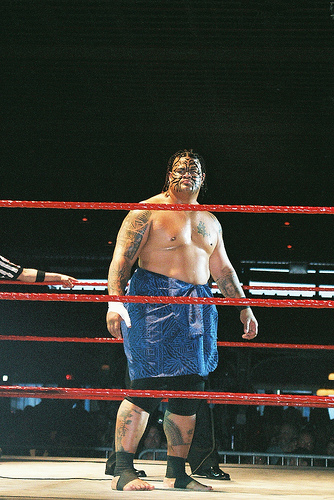 Last Friday, the wrestler Umaga died. He was found by his wife, unconscious and with a bloody nose, after suffering a heart attack in his sleep. He was rushed to the hospital, where he died, still unconscious, of a second heart attack. He was 36.
Last Friday, the wrestler Umaga died. He was found by his wife, unconscious and with a bloody nose, after suffering a heart attack in his sleep. He was rushed to the hospital, where he died, still unconscious, of a second heart attack. He was 36.
Wrestling fandom is an inscrutable thing. From the outside, it seems so silly, investing yourself into a "sport" so obviously scripted. Tune into any one of pro wrestling's intensely popular events and you'll see spectacular action, performed by absurdly talented musclemen. And you'll walk away knowing that the action was fake, that the muscles were ornamental. That the blood was ketchup and corn syrup.
But like all athletes, professional wrestlers display only the crest of their efforts. In pro wrestling's lead promotion, Worldwide Wrestling Entertainment, Inc., it takes a particular blend of kinetic showmanship and athleticism -- charisma and compelling storylines, a spectacular signature move -- to become a star. Mostly, though, it takes an insane amount of sacrifice. You grind up your muscle fibers with thousands of suplexes. You thunder your body into the mat.
Becoming a star takes something else: the delusional belief that that sacrifice is somehow all worth it. That the pinnacle of professional wrestling -- perhaps not so much a gilt WWE championship belt as the adoration of pro wrestling's legion of fans -- offsets the hellish climb to reach it. A delusion.
A delusion, because the sad truth is that professional wrestlers are not like all athletes. Here is a terrifying list of wrestlers who died before turning 50. What's especially jarring is the proportion of wrestlers on that list who were icons of the sport. Eddie Guerrero, a four-time WWE Tag Team Champion who died of heart failure at 38. Rodney "Yokozuna" Anoa'i, a two-time champion and a cousin of Umaga who only made it to 34. Chris Benoit, perhaps the most tragic story of all.
And now Umaga. Born Eckie ""Eddie" Fatu to the famous Anoa'i wrestling family (a notable descendent: Dwayne "The Rock" Johnson), he became a wrestler for the WWE in 2002, and again in 2005. As Umaga, the fearsome, tattooed Samoan warrior, he fought among the promotion's most touted until early 2009, when he was released from his contract for a second violation of the WWE's alcohol and drug policy. After a tour through Australia with Hulk Hogan over the latter months of the year, Fatu returned to his home in Texas in early December. There, then, he died, his body outwardly strong but really wracked by the poisons so endemic to professional wrestling.
I don't mean to make this a eulogy, to write an obituary instead of more appropriate holiday fare. I don't mean to imply that anyone could have foreseen this end for Umaga -- by many accounts, a good, good man. Most of all, I don't mean to politicize his life and chosen profession. Ask me 12 hours before his passing and I would have very likely been critical of him and his role in the WWE. But now it seems inappropriate. He was 36.
Reflecting on Eddie "Umaga" Fatu
Categories:
Contributor:










Comments